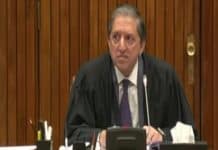Dr. AbdusSattar Abbasi
While looking through the Global Trustworthiness Index 2022 I recalled two instances of early 1990s related to my friends. One of those friends was doing house job after completing MBBS, once he said that being a doctor entails a great deal of responsibility because people share such a personal detail with doctors which I sometimes wonder that probably it may not be possible to share such information even with your spouse. Then he stressed that besides professional competence there should be significant emphasis on moral development of doctors to cope with exposure to sensitivities of medical treatments. One day when we met to our other friend, in a hospital where he was pursuing a course of medical technician, we found him quite furious; upon enquiry he named a doctor and said I simply can’t tolerate the doctor here because today when the doctor was examining a young lady he was extending his access where it wasn’t required.
In the report 59% respondents rated doctors as trustworthy, which mean doctors survived the test of credibility over times and proved to be the guardian of personal information of their patients/ clients. Report further suggests, “While 57% say the same about scientists, with teachers in third place at 52%. As in previous years, politicians are considered the least trustworthy with just twelve per cent considering them trusted. They are followed by government ministers (16%) and advertising executives (18%).” Clergy as a profession stands at number eleven earning trustworthiness of 26% respondents and remained forth for untrustworthiness by 40% of respondents.
A few weeks back in a meeting in my office I commented on a picture of two renowned religious scholars of Pakistan, one of those pursued careers in judiciary & education and has recently been ranked among top ten most influential Muslims globally while other is in politics. My guest a family member of the former responded to my skepticism of both being together and said actually in politics it is always about negotiating positions, exerting pressures, manipulations, slogans and exaggerated projections which attract attention of potential constituencies; therefore, people find space to malign a religious political leader. But this report equally undermines religious leaders if not exactly Muslim religious leaders; however, trustworthiness of religious leadership remained under scrutiny in numerous countries and certainly needs attention to restore their respect.
Demonstrating trustworthiness is critical to our success. When people know they can count on you to do what you say you will do, it builds trust, leading to better outcomes. It is more important than ever to demonstrate trustworthiness in today’s environment. Why? Because flood of information and dominating social media led overarching cynicism in human society. However, an absence of trust can turn partners into opponents, making it hard to get things done.
Trust is one of the most critical things in human relations. When we trust someone, we are willing to put our confidence in them, allowing us to cooperate and collaborate. When we trust someone, we are also more likely to share information with them for effective and efficient procedures.
Conversely, lack of trust impedes progress, eliminates confidence on institutions and peoples both leading to unrest and chaos in a society. It is because of this reason that some institutions such as judiciary and police are required to earn maximum trust of the public to maintain peace and harmony. But surprisingly both of these institutions have failed to record sufficient trust of public even in countries such as United States, Italy and Japan.
According to the website of Merrimack College, “In many professions, it’s easy to overstate the importance of the job. But in the case of our educators, it’s more likely that people will underestimate the importance of teachers in our society. For those who have dedicated their lives to teaching others, it’s good to reflect on the vital importance well-educated, quality teachers play in shaping the world around us. Taking on the task of shaping young minds is a big responsibility. To say that teachers can change lives is not an exaggeration. The truth is, outside of their own home, one of the biggest role models in a young person’s life is standing at the front of the classroom. Teachers are people to look up to and emulate. Nearly everyone has a teacher (in many cases, quite a few teachers) who they admired and who provided them with an example of how to conduct themselves.” It was indeed pleasant to see teachers at number three in the index. Together with doctors and scientists top three slots clearly indicate where societies are successful in delivering the promise. It is all about dedication and commitment which earns trust of the society.
There is no space for manipulations, exaggerations and complacence to earn respect and trust of masses as it is evident that advertising executives, business leaders and civil servants are at the bottom in terms of trustworthiness and also occupy top upper slotsfor untrustworthiness. It emphasizes the need for relevant educational and training programs for these professions to inculcate conscientiousness among those who aspire to pursue their careers in these areas.Armed forces are among top five professions to secure maximum trustworthiness of their people little more than ordinary men/women. It means discipline facilitates people to deliver duties responsibly according to common expectations.
However, interesting observation is to note trustworthiness for ordinary men/women. All these professions emerge from respective communities;people from the society chose these professions and perform given duties. Then what happens when we join these occupations and start losing trust of others. Is it the environment of that particular profession? Is it about surrounding forces which compel nonconformities? Or is it the self-interest which deviate innate tendencies? Whatever is the reason but results suggest it is not the usual environment which is to blame but the specific settings of these professions which need attention to earn trustworthiness of relevant societies.
Dr. AbdusSattarAbbasi
Associate Professor Management Sciences
Head, Center of Islamic Finance
COMSATS University (CUI) Lahore Campus
Tweets @drabdussattar

















